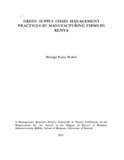Green supply chain management practices by manufacturing firms in Kenya.
| dc.contributor.author | Mukiri, Purity M | |
| dc.date.accessioned | 2013-05-10T11:31:17Z | |
| dc.date.available | 2013-05-10T11:31:17Z | |
| dc.date.issued | 2007 | |
| dc.identifier.citation | Master of Business Administration (MBA), | en |
| dc.identifier.uri | http://erepository.uonbi.ac.ke:8080/xmlui/handle/123456789/21311 | |
| dc.description.abstract | The green management literature argues that in order for construes to embrace new environmentally responsible values, beliefs and behaviours, there is strong need to green the entire supply chain. The objective of the study was to identify the GSCM practices and the challenges faced by manufacturing firms. The' questionnaires and data collection methods helped to bring out the results of the study as expected. The results obtained indicated that the practice that received the least consideration was reverse logistics and that the multinationals were more aware of the practice than the locals. The relevance of GSCM in overcoming environmental challenges was highly appreciated. Factors acting as barriers to adoption were exemplified. The conclusions and directions for further research point to the fact that environmental challenges in Kenya are complex and the Green Supply Chain Management practice is yet to be adopted. The government has been viewed as the one responsible for the slow pace towards implementation. This creates the quest for further research in the same area including the service sector. | en |
| dc.language.iso | en | en |
| dc.publisher | University of Nairobi | en |
| dc.title | Green supply chain management practices by manufacturing firms in Kenya. | en |
| dc.type | Thesis | en |
| local.publisher | School of Business | en |

